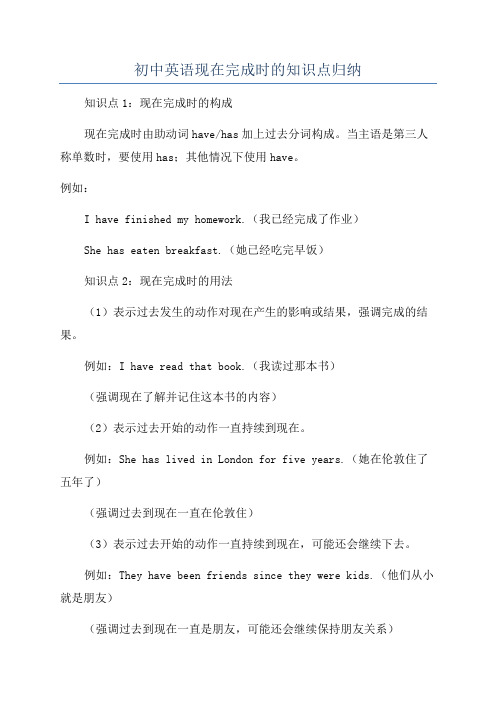初中英语时态讲解:现在完成时d
初中时态讲解《现在完成时》(共28张PPT)

•
—I have _____ to Kunming with my
friends.
• A been , gone
B been , been
• C gone , been
D gone, gone
• ( C )2. How long have you ____ this book?
• A. bought B. borrowed C. had D. lent
Yes,she has.?No,she hasn’t.
4.时间状语:already, yet, ever, never, just, before , for, since, so far, till/until, up to now, in the past/last few years, recently, … 等.
5.现在完成时的概念
1)表示过去发生或已完成的动作对 现在造成的影响或结果;
2) 表示过去已经开始并一直持续 到现在的动作或状态。
• 意义1
• 表示过去发生或已完成的动作对现在造成的影响 或结果
My daughter hasjust gonoeut. 我女儿刚出去。 (go)
I’m sure we have metbefore. 我肯定我们以前见 过面。(meet)
3.They have left only for 5 minutes. 错 They have __b_ee_n_ __a_w_a_y only for 5 minutes.
• 1) They came here last week.
• They ____h_a_v_e__ _b_e_e_n_____ here since ______la_s_t_ w__e_e_k______.
现在完成时讲解课件

1
2
现在完成时的主要用法
表示过去发生的某一动作对现在造成的影响或结果。
表示过去已经开始, 持续到现在的动作或状态,
表示人曾有过或到目前为止从未有过的经历
现在完成时的主要用法
现在完成时的运用(1): 在表示“用法1”时,现在完成时常和副词already, yet, never, ever ,before ,just等连用。
Eg. I haven’t had breakfast yet. Have you had breakfast yet?
否定句:句末 “还(没)”
yet在现在完成时中的用法
疑问句: 句末 “己经”
b) never 是否定词,表示“从来没有”,而ever 表示“曾经”
We have never been to the Great Wall. 我们从来没有去过长城。 Have you ever been to Canada? 你们曾经去过加拿大吗?
4. I __________ (read) the novel twice. It’s interesting. 5. She _________(go) to Pairs, hasn’t she? Yes. How ______ she _______(go) there? She _______(go) there by air. 6. So far, many countries _______________(develop) their software programs. 7.Mr Chen ______(give)up smoking last year. 8.Mr Chen __________(give) up smoking since last year.
初中英语现在完成时的知识点归纳

初中英语现在完成时的知识点归纳知识点1:现在完成时的构成现在完成时由助动词have/has加上过去分词构成。
当主语是第三人称单数时,要使用has;其他情况下使用have。
例如:I have finished my homework.(我已经完成了作业)She has eaten breakfast.(她已经吃完早饭)知识点2:现在完成时的用法(1)表示过去发生的动作对现在产生的影响或结果,强调完成的结果。
例如:I have read that book.(我读过那本书)(强调现在了解并记住这本书的内容)(2)表示过去开始的动作一直持续到现在。
例如:She has lived in London for five years.(她在伦敦住了五年了)(强调过去到现在一直在伦敦住)(3)表示过去开始的动作一直持续到现在,可能还会继续下去。
例如:They have been friends since they were kids.(他们从小就是朋友)(强调过去到现在一直是朋友,可能还会继续保持朋友关系)知识点3:现在完成时的时间状语现在完成时常与以下时间状语连用:just(刚刚)、already(已经)、never(从来没有)、ever(曾经)、yet(还、仍然)、recently (最近)、since(自从)、for(持续了多久)等。
例如:I have just finished my homework.(我刚刚完成了作业)Have you ever been to America?(你去过美国吗?)They haven't seen each other since last year.(他们自从去年就没有见过面了)知识点4:现在完成时与一般过去时的区别现在完成时强调的是过去的动作对现在的影响或结果,而一般过去时只表示过去发生的动作或状态。
例如:He has lost his key.(他丢了钥匙,结果是他现在找不到)He lost his key.(他丢了钥匙)知识点5:现在完成时否定句和疑问句的构成现在完成时的否定句和疑问句构成是在助动词have/has之后加not 或否定词,疑问句将助动词have/has提到句首。
初三英语《现在完成时》PPT课件

What has happened to the USA in the last 350 years?
注意点一: 现在完成时与一般过去时的用法比较 现在完成时表示过去的动作一直延续到现在甚至会继续下去或表示 过去的动作对现在造成的影响;一般过去时表示动作发生的时间在 过去。现在完成时属于现在时态范围,因此,不能和表示过去的时 间状语连用。 如:yesterday, last night, two weeks ago等 试比较: The plane has arrived . 飞机已经来了。(说明现在的情况:飞机 在这儿) The plane arrived a quarter ago. 飞机是一刻中以前来的。(强 调动作发生的时间在过去) I have taught here for fifteen years. 我在这儿已经教了十五年。 (表示十五年前的动作一直延续到现在,还可能会继续。) I taught here for a year. 我过去在这儿教过一年。(表示“我“现 在已经不在这儿任教了)
((√×))
He has joined the League member for two years. ( ×)
√ He has been a League member for two years. ( )
他已入团两年了。
The man has been dead for several years. The man has died for several years. 这个人已经死了几年了。
练习:用have(has) been 或have(has) gone 填空 A: Where __1__ Li Fei __1__? B: He __2__ to Hainan Island. A: How long __3__ he __3___ there? B: He ___4__ there for three days. A: When will he come back , do you know? B: I’m afraid he won’t come back recently. A: Could you tell me the way to Hainan Island? B: Sorry, I __5__ never __5__ there. A: How many times __6__ Li Fei __6___ to that place? B: He __7__ there only once.
2024年中考英语语法复习+—现在完成时课件

Have you seen the doctor? 你看过医生了吗?
在现在完成时中,当主语是I/you/we/they时,助动词用 have;当主语是第三人称单数时,助动词用has。
三、现在完成时的使用
1.表示过去发生并结束的动作对现在所产生的影响
He has left the city. 他已离开了这个城市。(结果:他不在这个城市。)
一、基本构成:have/has+done
I have finished my homework. 我已完成了作业。 (这里的finished就是动词finish的 过去分词。)
二、现在完成时不同人称的用法 I have washed my car.我洗过车子了。
We have done the whole work.我们干完了所有活儿。
A.practised
B.were practising C.have been practising
C
3 . —Where is mother?
—She is in the kitchen. She ________ the
housework all morning.
A.is doing
B.was doing
B.was studying
C.studied
D.have been studying
D
15 . “I _____ as everyone expects ”, Yao Ming
said .
A.haven’t played
B.haven’t been playing
C.didn’t play
D.am not playing
初中现在完成时讲解ppt

since
for
since
for
since
练习题: 1.It's a long time since we ____ (meet) last, isn't it? 2.--I know you ___________ (choose) a picture book among these. --Yes,Have a look at it, please. 3.So far, spaceships without people ___________ (reach) the moon and some other parts of the universe. 4.My father____ home for nearly three weeks. A.has gone away from B.has left C.has been away from D.went away 5.Mr. and Mrs. Green have_____in China for a week. A.been B.got C.arrived D.reached
eg.--- I’ve lived here for 15 years. eg.--- I’ve lived here since 15 years ago(1990)
选用for和since填空: 1.We haven’t seen each other ______ a long time. 2.His father has been in the factory ______ 10 years ago. 3.The film has been on ______ 20 minutes. 4.Mr Green has worked here ______ he came to China. 5.His grandparents have been dead ______ several years. 6. It’s five years _______ we met last time
时态详解:现在完成时

时态详解:现在完成时一、如何理解现在完成时现在完成时是英语中一个很重要的时态,也是很容易弄错的一个时态。
首先,我们来看看“现在完成时”该如何理解。
你可能会根据字面意思将其理解为:现在完成时就是表示现在已经完成的动作。
但是,这样的理解是很不全面的理解,甚至是很危险的!因为这样的理解将来误导你混淆现在完成时与一般过去的区别。
现在完成时有两个主要用法:一是已完成用法,也叫影响性用法。
该用法的现在完成时表示一个过去发生的动作在过去已经完成,并且这个过去发生并完成的动作对现在有影响或结果,同时说话强调的或感兴趣的就是这个影响或结果,如汉语说“他已离开这个城市了”,其中的“离开”肯定发生了,它对现在的影响或结果就是“他现在已不在这个城市了”;又如汉语说“有人把窗户打破了”,显然“打破窗户”这一动作发生在过去,并且在过去已经完成了,但说话人强调的重点是打破窗户对现在的影响——窗户现在仍是破的。
现在完成时的另一个用法叫未完成用法,也叫持续性用法。
该用法的现在完成时表示一个过去发生的动作或开始的状语在过去并未完成或结束,而是一直持续到现在,并且有可能继续下去(也可能到此结束),如汉语说“他在我们教书已有30年了”,显然“他在我们学校教书”是从30年前开始,并且一直教到现在,已经持续了30年;又如汉语说“自上个星期以来他一直很忙”,显然“忙”是从上个星期开始的,并且这一“忙”就一直忙到现在。
二、现在完成时构成与用法现在完成时由“have / has +过去分词”构成。
如:He has seen the film several times. 这部电影他已看了好几次。
I have known her for a long time. 我认识她很长时间了。
句中的has seen 和have known 均为现在完成时,第一句属影响性用法,其影响是“他对电影内容非常熟悉了”;第二句属持续性用法,指“认识她”已持续了很长一段时间。
初中英语八种时态讲解

现在完成时态现在完成时由“have/has + 过去分词”构成1.现在完成时的肯定式、否定式和疑问式以及简略回答:肯定式:I / We / You / They have cleaned the room .He / She has cleaned the room .否定式:I / We / You / They have not / havn’t cleaned the room .He / She has not / hasn’t cleaned the room .疑问式:Have I / we / you / they cleaned the room ?Has he / she cleaned the room ?简略回答:肯定Yes, I / we / you / they have . 否定No, I / we / you / they have not / havn’t .肯定Yes, he / she has . 否定No, he / she has not / hasn’t .1.现在完成时表示过去发生或已经完成的某一动作对现在造成的影响或结果。
这种用法有时不带时间状语,有时同just, already, yet, recently, never, ever, before 等表示不确定时间的副词连用。
I’ve just sent a fax to them. 我刚刚给他们发了一份传真。
The film hasn’t started yet. 电影还没有开始。
---Have you typed my letter already ?---Yes, I have. 你已经把我的信打好了吗?已经打好了。
We’ve bought a new house. 我们已经买了座新房子。
注意:在有表示过去的时间状语(last…, yesterday, …ago, when等)时,不能用现在完成时。
